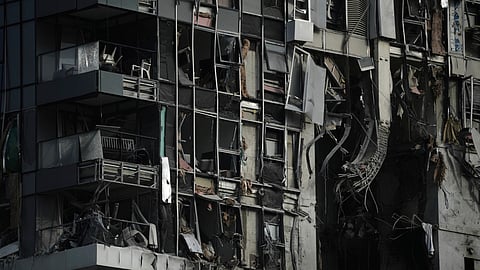

NEW DELHI: India has distanced itself from a recent Shanghai Cooperation Organisation (SCO) statement that sharply condemned Israel’s military actions against Iran, reaffirming its neutral stance and preference for diplomatic resolution.
External Affairs Ministry said on Friday that India’s position had already been outlined on June 13 and remains unchanged: “We urge that channels of dialogue and diplomacy be utilised to work towards de-escalation, and it is essential that the international community undertake endeavours in that direction.”
The MEA added that External Affairs Minister S Jaishankar had spoken with his Iranian counterpart Seyed Abbas Araghchi the same day, conveying international concerns and calling for restraint:
“He also urged the avoidance of any escalatory steps and an early return to diplomacy. The overall position of India, as stated above, was communicated to other SCO members. Keeping that in mind, India did not participate in the discussions" on the SCO statement.
The 10-member SCO bloc — which includes China, Russia, Iran, and Pakistan — issued a strongly worded statement criticising Israel’s military operations. It said: “Such aggressive actions against civilian targets, including energy and transport infrastructure, which have resulted in civilian casualties, are a gross violation of international law and the United Nations Charter.” The statement called the strikes an attack on Iran’s sovereignty and a threat to regional and global stability.
The SCO also reiterated its support for resolving issues around Iran’s nuclear programme through peaceful means, extending condolences to Iran and reaffirming its opposition to unlawful actions against member states.
It is rare that India abstains from an SCO statement except when it is on issues related to projects related to Chinese Belt and Road Initiative (BRI) on the grounds of sovereignty concerns.
India, meanwhile, renewed its call for calm “India urges both sides to avoid any escalatory steps. Existing channels of dialogue and diplomacy should be utilised to work towards a de-escalation of the situation and resolving underlying issues.”
India’s decision to opt out of the SCO consensus is notable. It is rare for New Delhi to abstain from a joint SCO declaration—typically only doing so when statements touch on projects linked to China’s Belt and Road Initiative (BRI), which India opposes on sovereignty grounds.
Tensions flared after Israel launched 'Operation Rising Lion,' targeting key Iranian sites including the Natanz nuclear facility. Among those reportedly killed were senior Iranian commanders Gen. Hossein Salami and Gen. Mohammad Bagheri.
India reiterated its neutral position, saying it maintains friendly ties with both countries and is ready to support peace efforts: “India enjoys close and friendly relations with both the countries and stands ready to extend all possible support.”
The MEA also confirmed that Indian embassies in Tehran and Tel Aviv are monitoring developments closely and are in touch with the Indian community to ensure their safety.
India had first expressed concern over the worsening situation on June 13, stating: “We are deeply concerned at the recent developments between Iran and Israel. We are closely monitoring the evolving situation, including reports related to attacks on nuclear sites.”